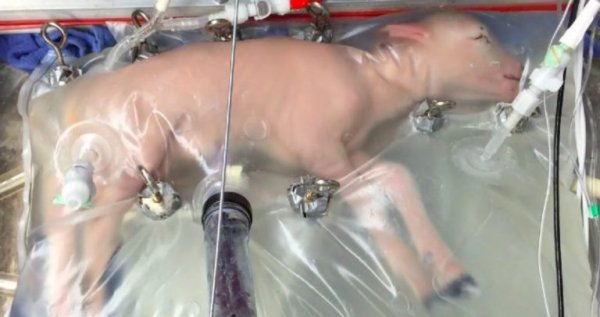Scientists Say Babies Will Grow In Artificial Wombs Within Ten Years By John Vibes for Natural Blaze
The abortion debate is once again taking center stage in US politics, and the prospect of artificial wombs is slowly becoming a part of the conversation, as the technology is actually starting to become a reality. According to some experts in the field, we are just a decade away from this type of technology reaching the public.
Dr. Carlo Bulletti, associate professor at Yale University’s obstetrics, gynecology, and reproductive science department, has predicted that a fully functioning artificial womb could be used in the medical field in the next ten years.
Scientists call this Ectogenesis, which is an artificial pregnancy outside of the body. Numerous experiments have tested this process with animals and have been slowly advancing the success rates of the procedure. In the most notable of these experiments, a premature lamb was kept alive for weeks in an artificial womb.

Study: Artificial womb technology and the frontiers of human reproduction: conceptual differences and potential implications
There are still concerns about how a pregnancy like this would impact the health and mental development of the baby, considering the importance of bonding, but many experts insist that artificial births are the future.
In a recent interview with Metro, Dr. Anna Smajdor, associate professor of practical philosophy at the University of Oslo, explained that bonding can happen mentally, but did not address whether or not this could cause developmental issues for the baby.
“Many arguments have been made about the necessity of gestation and childbirth for bonding. Although it may be true that the physical closeness between mother and baby facilitate bonding, it is certainly not true that it is necessary for bonding. If it were, fathers would have no claim to be bonded with their children. Not just this, but it is becoming increasingly clear that traumatic births actually impede maternal bonding, rather than the other way round,” Smajdor said.
“With developments in technology, increasingly, parents describe the moments of special bonding as being when they see the first scans. So this seems to imply that it is a visual connection that is regarded as being important rather than the physical one per se. Ectogenesis could actually facilitate this kind of visual bonding,” she added.
In an article for Wired, Tech writer Matt Chessen said that people in the future will find traditional pregnancy unappealing.




